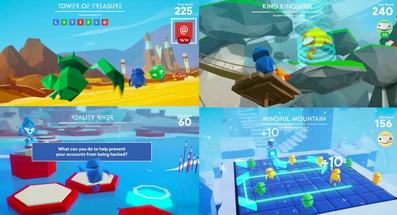
So working on digital citizenship has always been an issue in the younger grades. We talk about keeping your information private and being 'net savvy, but they are 10 and don't listen. How many of your elementary students already have a Facebook page?
Anyway, Google introduced this new game called Interland. I am so excited to work on this with my students to strike up some honest conversation about digital citizenship and being safe online. Essentially, Google has gamified Digital Citizenship.

Kids can play their way to being Internet Awesome with Interland, an online adventure that puts the key lessons of digital safety into hands-on practice with four challenging games. To make the most of the Internet, kids need to be prepared to make smart decisions. Be Internet Awesome teaches kids the fundamentals of digital citizenship and safety so they can explore the online world with confidence.
This game has several level such as:
BE INTERNET SMART
Share with Care
Good (and bad) news travels fast online, and without some forethought, kids can find themselves in tricky situations that have lasting consequences. The solve? Learning how to share with those they know and those they don’t.
Communicate Responsibly
BE INTERNET ALERT
Don’t Fall for Fake
It’s important to help kids become aware that people and situations online aren’t always as they seem. Discerning between what’s real and what’s fake is a very real lesson in online safety.
Know the Signs of a Potential Scam
BE INTERNET STRONG
Secure Your Secrets
Personal privacy and security are just as important online as they are offline. Safeguarding valuable information helps kids avoid damaging their devices, reputations, and relationships.
Create a Strong Password
BE INTERNET KIND
It’s Cool to Be Kind
The Internet is a powerful amplifier that can be used to spread positivity or negativity. Kids can take the high road by applying the concept of “treat others as you would like to be treated” to their actions online, creating positive impact for others and disempowering bullying behavior.
Set an Example
BE INTERNET BRAVE
When in Doubt, Talk It Out
One lesson that applies to any and all encounters of the digital kind: When kids come across something questionable, they should feel comfortable talking to a trusted adult. Adults can support this behavior by fostering open communication at home and in the classroom.
Encourage Internet Brave Behavior
Overall, I am pretty excited to try this out with my students this upcoming school year. Join me in working on Digital Citizenship!
This game has several level such as:
BE INTERNET SMART
Share with Care
Good (and bad) news travels fast online, and without some forethought, kids can find themselves in tricky situations that have lasting consequences. The solve? Learning how to share with those they know and those they don’t.
Communicate Responsibly
- Encourage thoughtful sharing by treating online communication like face-to-face communication; if it isn’t right to say, it isn’t right to post.
- Create guidelines about what kind of communication is (and isn’t) appropriate.
- Keep personal details about family and friends private.
BE INTERNET ALERT
Don’t Fall for Fake
It’s important to help kids become aware that people and situations online aren’t always as they seem. Discerning between what’s real and what’s fake is a very real lesson in online safety.
Know the Signs of a Potential Scam
- If statements about “winning” or getting something for “free” feel too good to be true, they most likely are.
- Fair exchanges shouldn’t involve giving away any personal information.
- Always think critically before acting online and learn to trust your intuition. Be on guard for phishing attempts—efforts to steal information like login or account details by pretending to be a trusted contact in an email, text, or other online communication.
BE INTERNET STRONG
Secure Your Secrets
Personal privacy and security are just as important online as they are offline. Safeguarding valuable information helps kids avoid damaging their devices, reputations, and relationships.
Create a Strong Password
- Make it memorable, but avoid using personal information like names or birthdays.
- Use a mix of uppercase letters, lowercase letters, symbols, and numbers.
- R3pl@ce le++ers wit# sYmb0ls & n^mb3rs 1ike Thi$.
- Do not use the same password on multiple sites.
- Create a few different variations of the same password for different accounts.
BE INTERNET KIND
It’s Cool to Be Kind
The Internet is a powerful amplifier that can be used to spread positivity or negativity. Kids can take the high road by applying the concept of “treat others as you would like to be treated” to their actions online, creating positive impact for others and disempowering bullying behavior.
Set an Example
- Use the power of the Internet to spread positivity.
- Stop the spread of harmful or untrue messages by not passing them on to others.
- Respect others’ differences.
- Block mean-spirited or inappropriate behavior online.
- Make an effort to provide support to those being bullied.
- Encourage kids to speak up against and report online bullying.
BE INTERNET BRAVE
When in Doubt, Talk It Out
One lesson that applies to any and all encounters of the digital kind: When kids come across something questionable, they should feel comfortable talking to a trusted adult. Adults can support this behavior by fostering open communication at home and in the classroom.
Encourage Internet Brave Behavior
- Be clear about family or classroom rules and expectations around technology, as well as consequences for inappropriate use.
- Keep the dialogue going by checking in frequently and encouraging kids to ask questions.
- Extend the conversation to other trusted adults like teachers, coaches, counselors, friends, and relatives.
Overall, I am pretty excited to try this out with my students this upcoming school year. Join me in working on Digital Citizenship!
 RSS Feed
RSS Feed